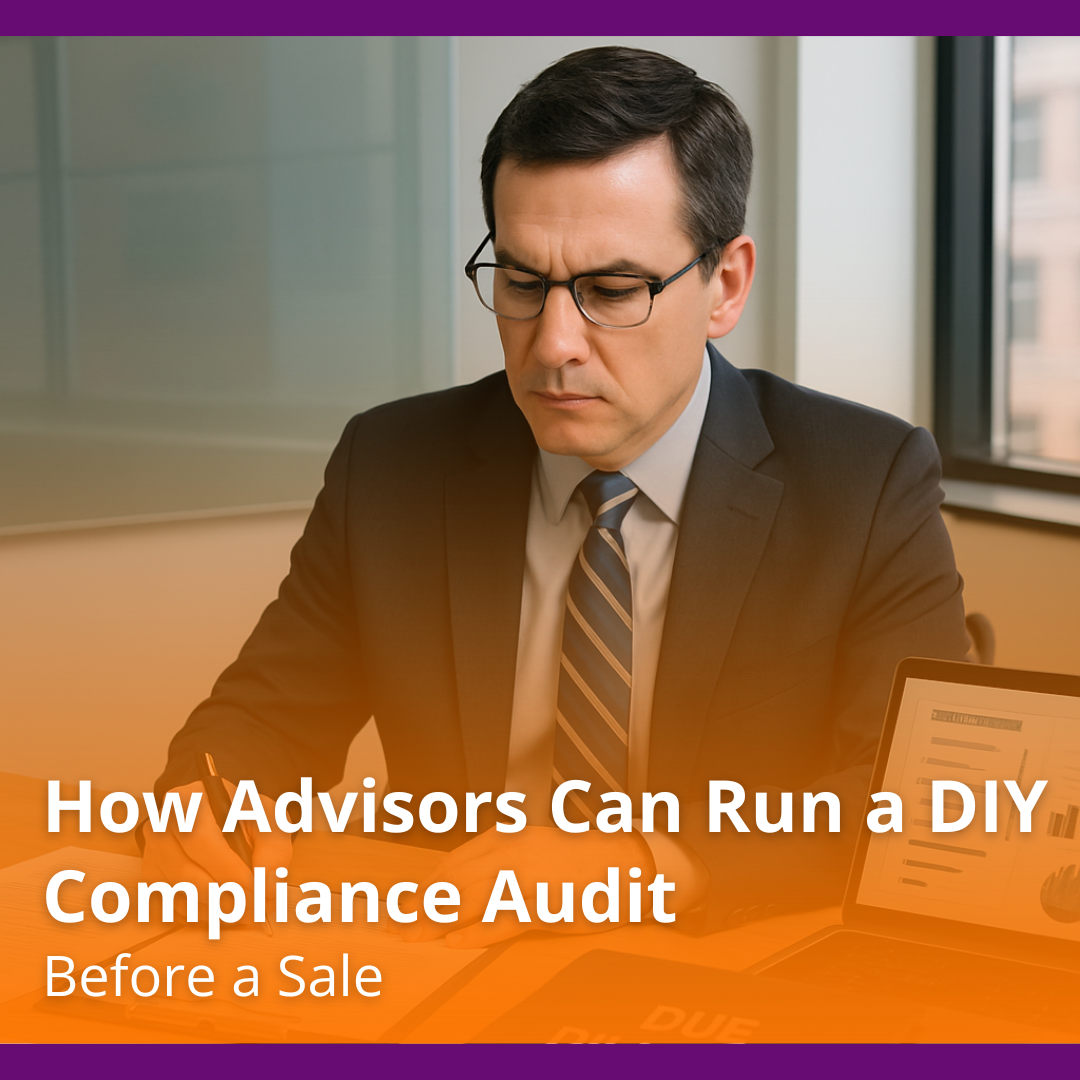How to Know If You’re Emotionally Ready to Sell Your Advisory Practice
You have pictured the day you sell your advisory practice. The deal closes. The pressure lifts.
Comprehensive, data-driven valuations and comparative equity analyses to accurately price your practice, establish market benchmarks, and support informed decision-making.
Comprehensive M&A guidance encompassing deal structuring, negotiation strategies, market listings, and transaction closings.
Comprehensive systems, targeted coaching, and in-depth assessments designed to optimize operational efficiency and enhance advisory team effectiveness.
Strengthen continuity through the implementation of formal continuity agreements, the establishment of legal entities, execution of enforceable legal contracts, and securing appropriate capital resources.
5 min read
 Anthony Whitbeck, CFP®, CLU®
October 24, 2025
Anthony Whitbeck, CFP®, CLU®
October 24, 2025

Preparing your advisory firm for sale means facing due diligence, and minimizing surprise red flags is critical. A compliance audit in this context involves systematically reviewing your contracts, records, internal policies, licensing, marketing materials, and cybersecurity controls to ensure everything is complete, documented, and defensible.
Compliance complexity remains a significant challenge, with 77% of companies reporting negative impacts on growth due to compliance issues, according to PwC’s Global Compliance Survey 2025. If buyers uncover missing documentation, inconsistent policies, or weak controls, your firm’s valuation, timeline, or even the deal itself could be at risk.
In this post, you’ll find a clear roadmap and checklist to conduct your own compliance audit before a sale. You’ll learn when to begin, which areas to review, how to organize your findings, and when it’s best to engage a professional. Let’s get you audit-ready before your buyer asks.
Compliance isn’t a formality. It’s deal insurance. Skip it, and you risk delays, price cuts, or failed closings.
Buyers care about more than your revenue. They want proof that your internal controls, tax compliance, and risk management are airtight. If your compliance audit process is sloppy, they’ll assume your operations are too.
An audit-ready firm with centralized records, clean tax returns, and documented policies signals trust and drives value. However, gaps such as missing contract compliance audit data or unfiled sales tax raise red flags quickly.
Compliance audits may not be exciting, but they’re critical. They protect your valuation, reduce risk, and make the deal smoother for all parties involved.
Audit readiness matters, especially when you’re on the clock. Start your compliance audit process 6 to 12 months before listing your practice. That gives you time to identify issues, take corrective action, and avoid deal-killing surprises.
For smaller firms with clean records, internal compliance reviews can take as little as 30–45 days. Larger practices with complex ownership, multi-state sales tax exposure, or layered compensation may need 3–6 months. The earlier you begin audit preparation, the smoother the audit.
You’re not audit-ready if you can’t instantly produce client contracts, WSPs, regulatory filings, or proof of data protection measures. Relying on outdated accounting software or missing audit trails? That’s a problem.
Whether you handle it in-house or bring in a third-party auditor or CPA, the goal is the same: complete compliance, clean audit reports, and zero surprises during due diligence. Need expert support to align your compliance preparation with your exit strategy? Advisor Legacy's Practice Sales team can guide you through both.
A clean audit starts with structure. Without it, you risk missing key areas of compliance, overloading due diligence with disorganized records, and losing leverage in negotiations. The goal is simple: streamline the audit process, follow a checklist, and walk into buyer meetings audit-ready.
This step-by-step guide outlines the exact areas you need to inspect to ensure your practice is fully compliant, risk-mitigated, and ready to hand over.
Start with the most critical deliverable: contracts. Gather all client agreements, investment policy statements, and vendor contracts. Every document should be signed, dated, and aligned with current compliance requirements.
Check that they comply with federal law and relevant state standards, especially if you operate across multiple jurisdictions with varying sales tax rates, nexus rules, or indirect tax exposure. Missing or outdated contracts are one of the fastest ways to derail a deal during contract compliance audit reviews.
Validate your registration filings, licenses, and Form ADV disclosures. Lapsed or incorrect records trigger red flags for auditors and buyers. If you serve clients across state lines, confirm your practice adheres to each state’s regulatory requirements and sales and use tax obligations. It shows your compliance processes are proactive—not reactive.
Outdated written supervisory procedures (WSPs) or missing documentation around internal controls are a sign of non-compliance. Review employee handbooks, escalation policies, and your overall compliance processes.
Ensure your policies reflect current standards and regulations, including data protection protocols, workflow adherence, and end-to-end supervision. Buyers see this as a snapshot of how well you run your business.
Conduct a contract-level audit of your marketing materials, including emails, newsletters, websites, webinars, and social media posts. Everything must meet FINRA and SEC advertising compliance rules.
Maintain an archive of all outbound communications. A compliant archive should be automated, searchable, and tamper-proof. Use a compliance platform or third-party vendor to centralize these assets. Poor archiving or unapproved content is a major red flag in any successful compliance audit.
Effective recordkeeping underpins a smoother audit. Review your CRM, financial reporting software, and accounting tools. Confirm that all invoices, sales tax documentation, exempt sales records, and tax returns are complete, accessible, and audit-ready.
Your system should automate data capture, preserve audit trails, and support version control. Inconsistent records or missing financial statement audits can lead to penalties or, worse, disqualify your practice from serious buyer interest.
Buyers will scrutinize your data security as closely as your financials. Skipping cybersecurity in your audit is a critical oversight.
Verify encryption protocols, access controls, incident response plans, and employee training logs. Ensure your cybersecurity setup aligns with SEC guidance as of September 2025. Data breaches or failure to meet compliance measures around privacy can reduce the perceived value of your firm and increase buyer risk.
Some problems go beyond what a checklist or internal audit can fix. If you hit any of these red flags, it’s time to bring in a third-party auditor or a CPA who specializes in tax audits and regulatory compliance.
Multiple LLCs, cross-state subsidiaries, or inconsistent entity records often require a full contract compliance audit. These structures can hide liabilities that derail deals if not identified and remediated early. A professional can spot gaps in overall contract performance and help you proactively take corrective action.
Pending client disputes, FINRA disclosures, or SEC inquiries are deal-breakers unless addressed before due diligence. Buyers will want to review audit reports and documented steps and best practices used to resolve these issues. It all hinges on transparency and full disclosure.
If you’re struggling to produce tax returns, audit trails, or state income tax filings, you’re not audit-ready. This includes areas like local tax exposure, sales tax audits, or indirect tax documentation. Gaps in tax management compliance often require external support to meet regulations and standards.
Outdated or manual workflows often fail to meet audit readiness standards. Without compliance automation, it’s easy to miss key deliverables or create inconsistencies across systems. Bringing in outside help to streamline the process and align your documentation with regulatory requirements can reduce the risk of non-compliance.
One of the biggest mistakes sellers make is waiting until negotiations before starting their audit. By then, there’s no time to fix issues. Others overlook small but costly gaps like outdated fee disclosures or missing vendor contracts. And yes, some attempt to "clean up" records retroactively.
Starting early gives you time to fix issues, document everything, and show buyers your house is in order. That’s what buyers want—and what gets deals done. For a deeper look at how compliance fits into the broader exit timeline, check out our complete guide to selling a financial advisory practice.
Finishing your compliance checks isn’t enough. You need to present them in a way that proves you're audit-ready. Buyers want clear, organized evidence that your firm is compliant, transparent, and prepared for a successful audit.
Create a secure, indexed data room with folders for contracts, tax filings, cybersecurity protocols, and internal policies. Add summaries for each area, like contract compliance audit findings, IRS audits, and resolved issues.
Flag past issues and show your corrective steps. It’s better to lead with transparency than scramble to explain gaps. A successful compliance audit isn't just about what you check—it's how you package it. Make it easy for buyers to scan and verify your checklist. The smoother the handoff, the faster the close.
Preparing for a compliance audit before listing your practice is foundational. Advisors who take the time to document, disclose, and organize will always earn more trust (and higher offers) from serious buyers.
A successful compliance audit shows that your practice is not just compliant, but operationally sound and built for transition. It tells buyers: there are no hidden risks, and no surprises waiting on the other side of due diligence.
Ready to put your firm on the market with confidence? Explore Advisor Legacy's Practice Sales Services to get expert support with your exit strategy, valuation, and audit readiness—all in one place.
Anthony "Tony" Whitbeck, CFP®, CLU®, is CEO and Owner of Advisor Legacy. He began his career as a financial advisor in 1989 and later shifted to coaching, where he’s guided more than two hundred advisory practices through growth, valuation, and succession. Tony leads Advisor Legacy’s certified third-party valuation engagements and coordinates lending and legal partners to streamline transactions. His articles focus on building transferable enterprise value, mapping internal vs. external exits, and avoiding common succession pitfalls. Drawing on decades of in-the-trenches experience, Tony provides practical, compliance-friendly guidance advisors can use right away.
Receive timely articles, tip sheets, events, and more right in your inbox.

You have pictured the day you sell your advisory practice. The deal closes. The pressure lifts.

Selling a company is often the largest financial event of a business owner’s life. Yet most exit conversations still revolve around valuation and...

Are you preparing to sell your business with a team you want to keep intact? Then you’re already thinking ahead. The moment a sale is in motion, your...